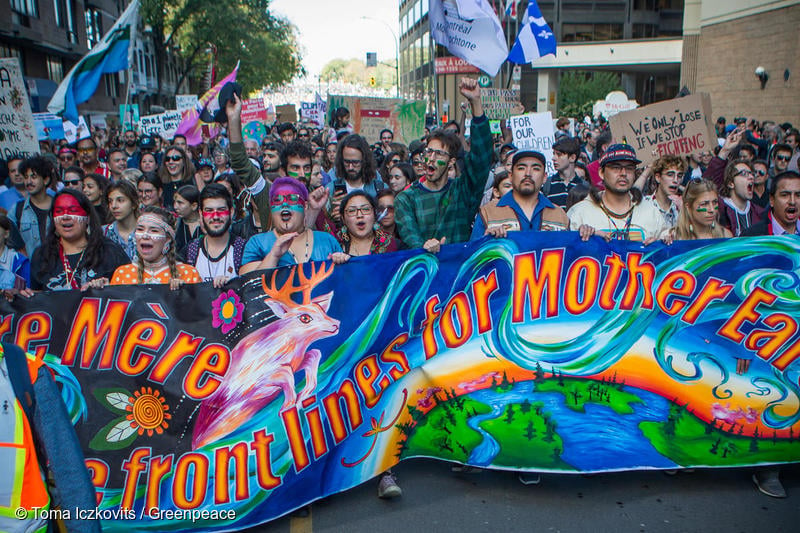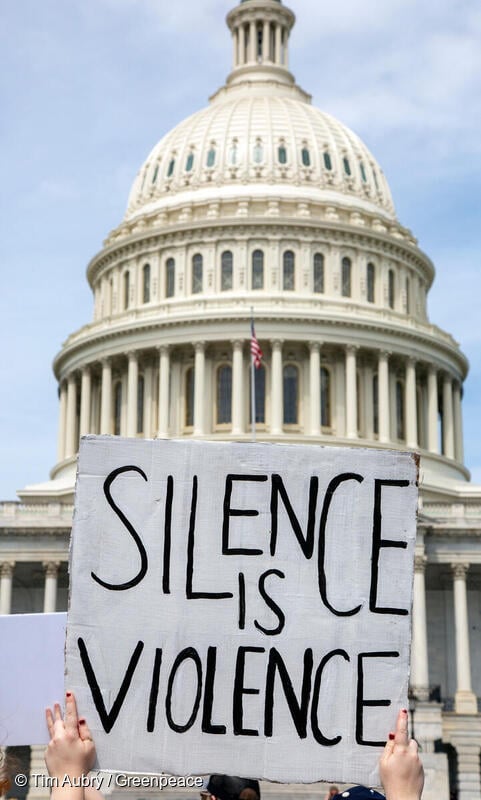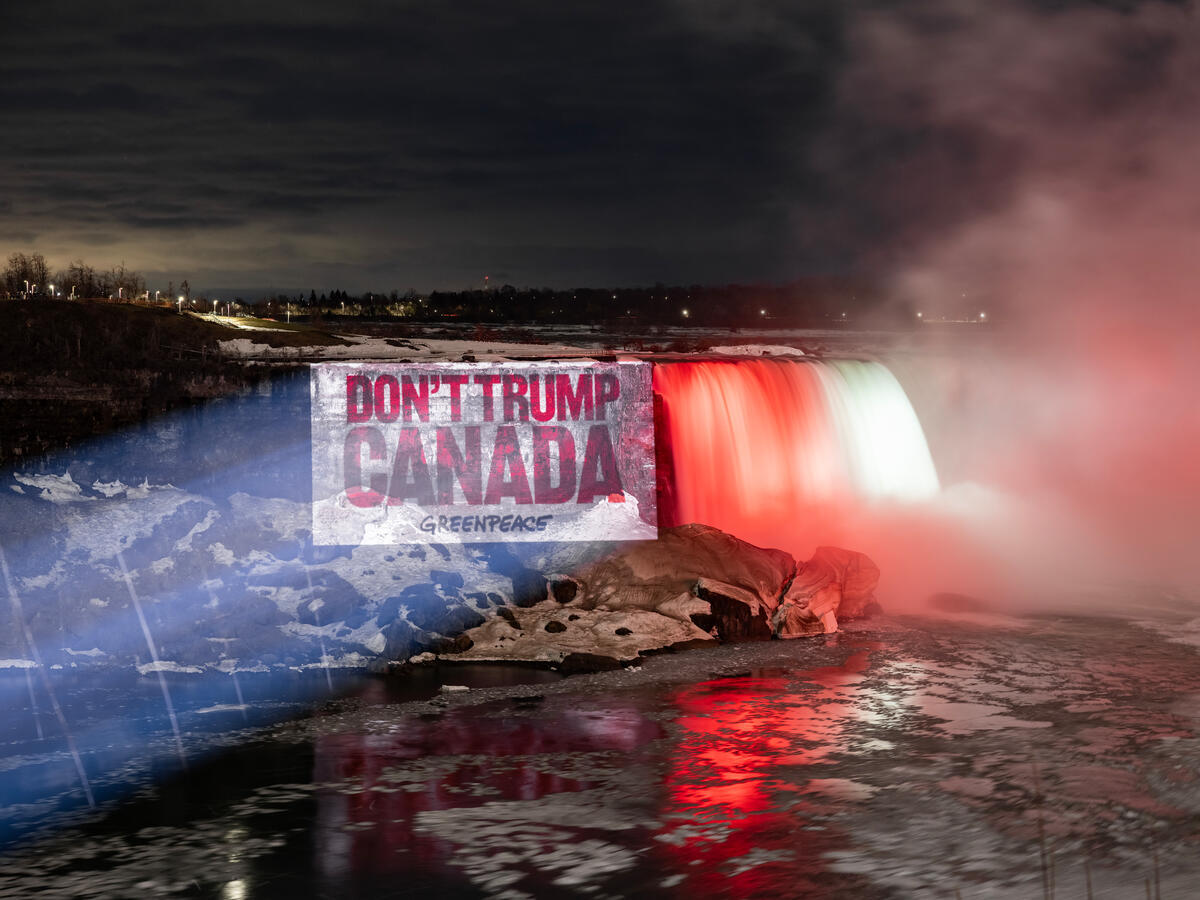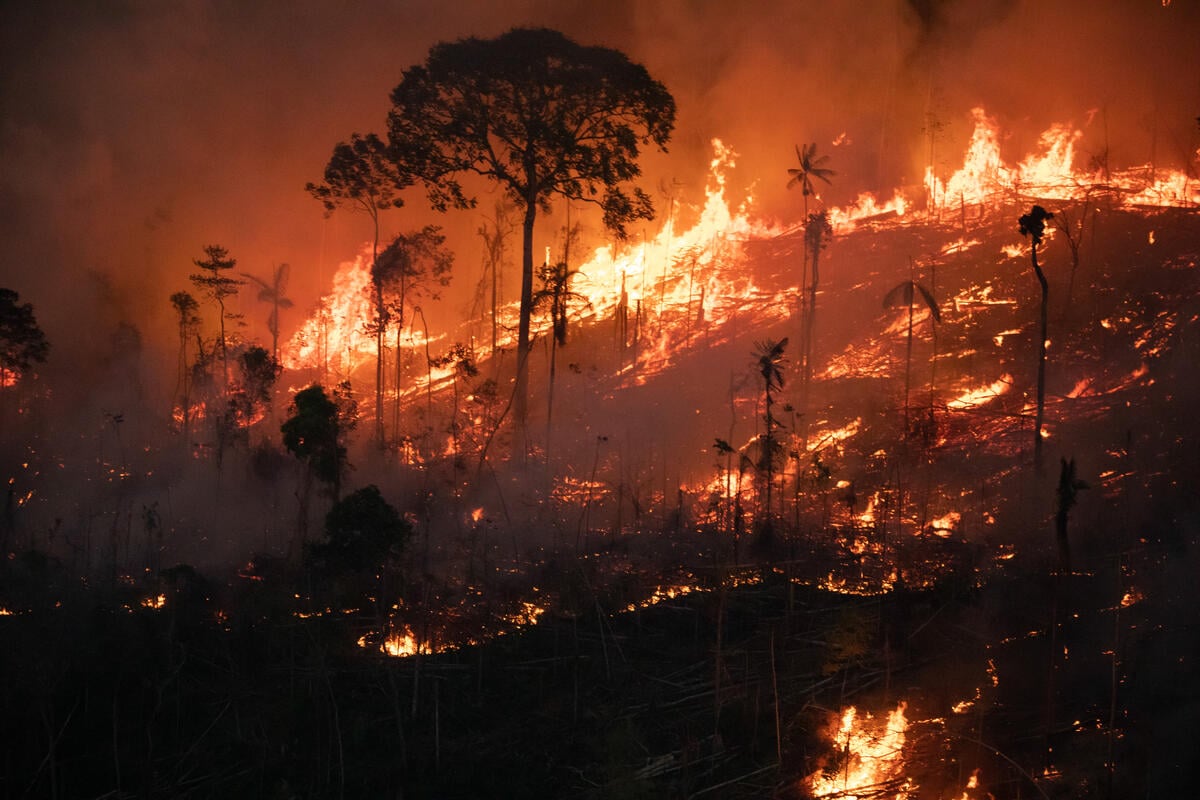It’s been a heavy few days.
As we mourn the countless Black lives lost at the hands of police and channel that grief and anger to rise up against police brutality and systemic racism, I feel compelled to speak up about white supremacy and police violence against Black and Indigenous communities here in Canada. I feel equally compelled to talk to Greenpeace supporters and followers about this ongoing oppression. Greenpeace has said before that connections between the struggles for environmental and racial justice partly explain why we speak out for the latter. But this is not true. Regardless of the links between these movements, we stand up against racial injustice and police brutality against Black and Indigenous communities and other communities of colour because it is inherently wrong and inhumane and enough is enough. We fight white supremacy because silence is complicity. My hope is that within and outside of the environmental movement in Canada, we will all step up our anti-racist activism.
Checking our “nice” Canadian assumptions
Regis Korchinski-Paquet, a 29 year old Afro-Indigenous woman fell from her Toronto balcony after an interaction with police last week. Jason Collins, a 36 year old Indigenous man, was shot and killed by Winnipeg police in April. Eishia Hudson, an Indigenous girl who was just 16, was also shot and killed by Winnipeg police in April, and along with these unconscionable stories of Black and Indigenous lives violently taken by police, there are still so many more from across Canada.
South of the border, George Floyd, a 46 year old Black man, was murdered by a police officer in Minneapolis which sparked widespread resistance in cities across the continent and the world. We also remember Breonna Taylor, Ahmaud Arbery, and countless other lives gone too soon. Racism and systemic violence from police against Black communities and individuals in the United States is dominating the news. We are quick to point fingers, but Canada’s history and its present day systems are steeped in white supremacy, too.
In Toronto, a Black person is twenty times more likely to be killed by a police officer than a white person. In Vancouver, ten years of data reveals that Black and Indigenous people are disproportionately over represented in police street-checks. In Halifax, a Black person is 6 times more likely to be stopped by police compared to white counterparts. Right now in Nunavut, five RCMP officers are being investigated for violent interactions with Inuit. These are very clear patterns of consistent systemic oppression against Indigenous and Black communities based on a history of the same violence: enslavement, stolen land, mass incarceration, environmental racism, residential schools, missing and murdered Indigenous women and girls, the Sixties Scoop, and more. Add to that the countless impacts other communities of colour face in this country, whether it’s an escalation of anti-Asian racism during the pandemic, Islamophobic attacks including the murder of six Muslims in Quebec in 2017, the list gets longer every single day.
The fact that systemic racial injustices are ingrained in Canadian society is undeniable.
More reading:
- Yes, Canada Has a Racism Crisis and It’s Killing Black and Indigenous Peoples by Pam Palmater
- Policing Black Lives: State Violence in Canada from Slavery to the Present, by Robyn Maynard
- The Skin We’re In by Desmond Cole
Listen/Watch:
- Colour Code: A podcast about race in Canada from the Globe and Mail
- Code Switch: Race. In Your Face from NPR
- The Skin We’re In on CBC Gem
Petitions:
- Justice for Regis Korchinski-Paquet
- Justice for George Floyd
- Demand racial data on police involved deaths in Canada
Root causes of injustice
The values that inform the struggles for Black liberation and Indigenous sovereignty are shared in the fight for environmental justice. These connections are not needed to justify solidarity, because it’s critical for us to be anti-racist regardless, but each of these injustices stem from and seek to dismantle the same root causes. Annie Leonard, Executive Director at Greenpeace USA said it well in a 2016 blog:
“We can’t have a green and peaceful future without racial justice, equity, civil rights, and empowered communities. We believe the systems of power and privilege that destroy the environment also strip vulnerable communities of their humanity — and too often, their lives.”
In Canada, corporate and government powers have for too long put profits before people and the planet. Moreover, BIPOC (Black, Indigenous and People Of Colour) and lower income communities are disproportionately impacted by environmental degradation and are experiencing the most severe impacts of climate change, here in Canada as well as globally. Dismantling colonial oppression, capitalist greed, and white supremacy will allow us to build a more equitable and community-centred future, one that protects all life on the planet, one that decentralizes power from benefiting the few to the many. So a solution to one of these injustices will work to dismantle them all.
We need systemic change all around. Divesting funding from policing to reinvest in communities. Ambitious climate policy and food security solutions. Standing up for Indigenous Sovereignty and free, prior, and informed consent. Ensuring protection for biodiversity. If we truly want a green and peaceful future for all, we must consider this fuller picture and fight for it all.

More reading:
- Defunding The Police Will Save Black And Indigenous Lives In Canada, by Sandy Hudson
- Movement for Black Lives Policy Platform
Using our privilege for good
Greenpeace’s mandate is to work towards a green and peaceful future and to confront systems that threaten the environment, including systems that inhibit equity and justice.
We have a reputation for being a disruptive, bold, risk-taking organization that speaks truth to power. We at Greenpeace Canada also carry a great deal of privilege as a mostly white, settler organization that has been successful in building international influence. I would be remiss not to mention here that many of our global offices and departments are staffed or led by people of colour who contribute in significant ways to our global work. We can and should do more to lend our privilege and skills to bring more people into the fold of fighting white supremacy and to stand in solidarity with those on the frontlines of the fight for Black liberation and Indigenous sovereignty.
Greenpeace has not always prioritized anti-racism work. Far from it. We need to acknowledge and own that. But we prioritize it now, and our staff and leadership today commit to embodying anti-racism in all of our work to ensure the “peace” in Greenpeace is not lost.

How you can be an anti-racist environmentalist
If you are an environmentalist who has not yet engaged in the fight for racial justice, I ask you to start. If you have shown solidarity, I ask you to do more. If you are not Black or Indigenous (and I include my fellow POCs in this category, particularly those who benefit from white supremacy) I ask you to examine your privilege, listen to Black environmental leaders and Indigenous environmental leaders, increase your awareness about the racism in our movement, learn about the experiences of BIPOC folks that work for environmental groups, and question whether you’re doing enough.
More information:
- Indigenous Climate Action website
- Black Environmentalists Talk About Climate and Anti-Racism in the New York Times
- Too White to Solve the Climate Crisis? by Jesse Firempong
- The climate crisis is racist. The answer is anti-racism by Eric Holthaus
In addition to the resource links shared here, there are many others online that will point you to more reading materials, places to donate or volunteer, petitions to sign and actions to amplify. I would also encourage you to put in the effort to do your own research and find ways to support Black and Indigenous organizations in your own community. If you find powerful anti-racist posts on social media, tag us (On Facebook: @greenpeacecanada, On Twitter: @greenpeaceCA, On Instagram: @greenpeace_canada) so we can increase our own knowledge and amplify those resources
Black and Indigenous people have the right to live without a fear of violence. If we are unable to prevent another death, we are not doing enough. Losing Regis Korchinski-Paquet and George Floyd in these last few days, and countless others before them, means we are already too late. Let’s rally to end all forms of injustice and get to that green and peaceful future for all.
More reading:
Follow:
- Black Lives Matter Vancouver on Instagram;
- Hoodstock on Facebook and Instagram (Montreal based);
- Not Another Black Life on Instagram and Twitter
Donate:
- There is a growing list of places to donate here, both in the US and in Canada.




Discussion
I believe that all of this unnecessary violence should stop otherwise we are going back 60 years ago when all of this was being addressed to provide freedom and civil rights to all. Disrespect and injustice are my two pet peeves. I can't understand why this is still happening in this day and age (2020) we should all have learned from the mistakes in the past, grow from it and be wiser and more mindful about it! This planet needs more humanity, empathy, compassion more than ever before. Peace and love are far higher in frequency then hostility and hatred. Equality for all people! We are all citizens of planet earth. Let's unite and work together towards a better world!
Reparations now and for ever! For the black and indigenous peoples! Make America great! Make the world great!✊??
I strongly agree. Canada has an immense racist problem and police violence issues as deeply intrenched as the USA. Silence is Violence says it well. We all need to be a voice for truth, justice and equality. I am also a very strong sup[porter of Indigenous rights over their lands. Our governments need to protect the land of the the indigenous communities from being raped and pillaged by investors and unethical conduct by government greed and bottom line focus and respect rights and environment above all else.
I am Afro hindo Caribbean this weekend after a lengthy delay I had to call 911 as my 22 yr old daughter is having mental and medical issues the only help that was dispatch was 3 units of the RCMP no medical services was dispatched .I told the dispatch we are a Afro American Family and scared of the police but my daughter is in dangerous medical distress .they came they called for medical services i was so scared that things could turn bad quick .My daughter almost died because of the distrust of RCMP for mental health calls there needs to be mental health units dispatch so everyone is safe
Ιf some one wants expert view about blogging afterward i recommend him/her to ցo to sеe this weblog, Keep up the pleasant јob.